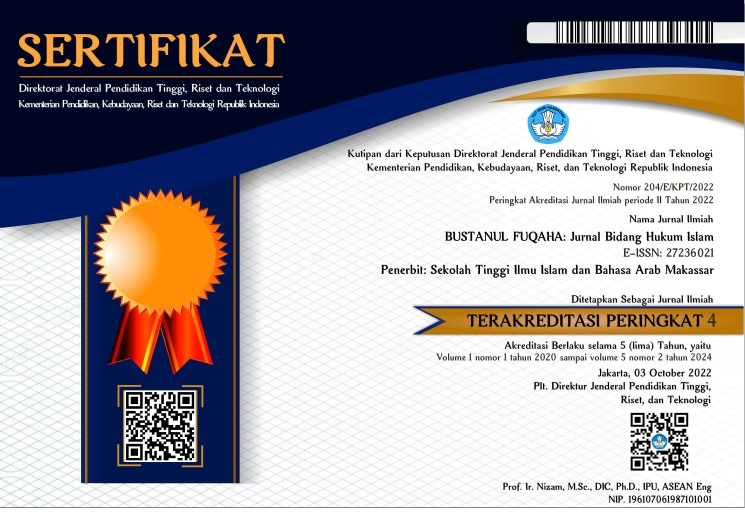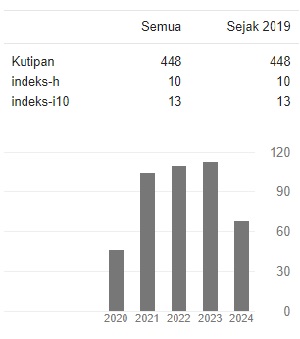Penggunaan Kontrasepsi Darurat Berdasarkan Permenkes No. 97 Tahun 2014 Perspektif Maqāṣid al-Syarī’ah
Emergency Contraception Based on Permenkes No. 97 of 2014 from Perspective of Maqāṣid al-Syarī’ah
DOI:
https://doi.org/10.36701/bustanul.v5i1.1139Keywords:
Emergency Contraception, Maqāṣid ash-Sharī’ah, Kontrasepsi Darurat, Maqāṣid asy-Syarī’ahAbstract
The use of contraception is one of the steps used by the Indonesian Government to support the “Kelurga Berencana” (KB) program. The various types of contraception regulated according to the Permenkes No. 97 of 2014 is emergency contraception, that can be used with the aim of preventing unwanted pregnancy and is used after sexual intercourse. The research aims to be an strengthens of previous research with the same discussion. However, in this research the authors used a different analytical tools to analyze this by using the theory of maqāṣid al-syarī'ah. The type of research is the library research method with the data collection process referring to primary, secondary data sources and also other supporting sources in this research. This research uses a normative juridical approach, an approach that seeks the truth of a matter, including legal concepts and principles from all sources of something (cases, laws or regulations). The results of this research are emergency contraception (KONDAR). If analyzed from the concept of maqāṣid al-syarī'ah, it can be concluded that the use of KONDAR is a functions as an effort to prevent the birth of children who do not have a clear lineage status because their mothers are victims of sexual violence. In terms of saving life and lineage, the use of KONDAR is a form of the main benefit of hifz al-nasf and the main benefit of hifz al-nasl.
Downloads
References
Gamelia Elviera dkk, “Rural Based Health Promotion Model for Pregnant Woman in Banyumas District.” National Publik Health Jurnal Vol. 11, No. 1 (2016).
Haeger Kristin O dkk, “State of emergency contraception in the U.S., 2018.” Springer No. 20 (september 2018).
Hanasin Nasrul dan Supardin, “Penggunaan Kontrasepsi Vasektomi dalam Pandangan Hukum Islam.” Qadauna Vol. 1, No. 2 (April 2020).
Handayani Sarah dkk, “Improving Communication Messages by Using Perceptual Mapping: Family Planning Survey in East Java and West Nusa Tenggara, Indonesia.” Sage Open Medicine Vol. 9 (Januari 2021).
Hashim Kamali, Mohammad, Membumikan Syariah, alih bahasa Miki Salman, cet. Ke- I, Jakarta: Mizan Publika, mei 2013.
Hayati Irma Nur, “Hukum Menggugurkan Kandungan dan Penggunaan alat Kontrasepsi Menurut Perspektif Hukum Islam.” Jurnal Qolamuna Vol. 1, No. 1, (Juli 2015).
Jambrina Anna M, “Characterization of the Use of Emergency Contraception from Sentinel Pharmacies in a Region of Southern Europe.” Jurnal of clinical medicine Vol. 10, No. 13 (Juni 2021).
Jiwantara Firzhal Arzhi dan Karmal Maksudi, “How are Government’s Liability in Indonesia and Netherland?: Juridical-Normative Study with a Comparative Approach.” Medico-legal Update Vol. 20, No. 4 (Desember 2020).
Komnas Perempuan, “Perempuan Dalam Himpitan Pandemi: Lonjakan Kekerasan Seksual, Kekerasan Siber, Perkawinan Anak, Dan Keterbatasan Penanganan Di Tengah Covid-19”, Catatan Kekerasan Terhadap Perempuan Tahun 2020, (Jakarta, 5 Maret 2021)
K. Upadhya Krishna, “Emergency Contraception.” Pediatrics Vol. 144, No. 6 (Desember 2019).
Mittal Suneeta, “Emergency contraception - Potential for women’s health.” Indian Journal of Medical Research Vol 140, Supll 1 (November 2014).
Muhaimin, Metode Penelitian Hukum, cet. Ke-1 Mataram: Mataram University press, 2020.
Musolli, ‘Maqāṣid asy-Syarī’ah: Kajian teoritis dan aplikatif pada isu-isu kontemporer.” Jurnal maqāṣid asy-syarī’ah dan isu-isu kontemporer Vol. V, No. 1 (Juni 2018).
Nazir Alias Muhammad dkk, “A Review of Maslahah Mursalah and Maqasid Shariah as Methods of Determining Islamic Legal Ruling.” Turkish Journal of Computer and Mathematics Education Vol. 12, No.3 (2021).
Nugraha Erik dkk, “Maqashid Sharia Implementation in Indonesia and Bahrain.” Etikonomi Vol. 19, No. 1 (2020).
Oyen Michelle L, “Engineering is pregnant with possibilities.” Sciene Advances Vol. 9, No. 4 (Januari 2023).
Paryadi, “Maqashid syariah: Definisi dan Pendapat Ulama.” Cross Border Vol. 4, No. 2 (Desember 2021).
Refaat Nora dkk, “Assessment of Reproductive Age Women Health Related Behavior Regarding Emergency Contraception Methods.” Zagazig Nursing Journal Vol. 19, No. 1 (Januari 2023).
Setiarini Tatik, “Gambaran Penggunaan Kontrasepsi Darurat bagi Akseptor KB di Kelurahan Ragunan Pasar Minggu.” Jurnal Ilmiah Kesehatan Keris Husada Vol. 6, No. 2 (November 2022).
Setiwati Erna dkk, “Pemilihan Kontrasepsi Berdasarkan Efek Samping Pada Dua Kelompok Usia Reproduksi.” Unnes Jurnal of Publik Health Vol. 6, No. 3 (Juli 2017).
Shabbir Malik Shahzad, “Human Prosperity Measurement within The Gloom of Maqasid Al-Shariah.” Global Review of Islamic Economics and Business Vol. 7, No. 2 (2019).
Sri Hayati dkk, “Hubungan Pengetahuan Ibu Tentang Metode Kontrasepsi Dengan Pemilihan Kontrasepsi.” Jurnal Keperawatan BSI Vol. 5, No. 2 (September 2017).
Syathibi as-, Almuwafaqat, cet. Ke-1, Beirut: Darul Kutub Al-Ilmiyah, 2004.
Tan David, “Metode Penelitian Hukum: Mengupas dan Mengulas Metodologi dalam Menyelenggarakan Penelitian Hukum.” Nusantara: Jurnal Ilmu Pengetahuan Sosial Vol. 8, No. 8 (2021).
Tisnilawati, “Gambaran Pengetahuan Ibu PUS Umur 20-35 tahun tentang Kontrasepsi Darurat di Marendal Pasar V Kecamatan Patumbak Kabupaten Deli Serdang Tahun 2015.” Jurnal Ilmiah Kohesi Vol. 2, No. 2 (Mei 2018).
Toriquddin, Moh, “Teori maqāṣid asy-syarī’ah perspektif al syatibi.” Jurnal Syariah dan Hukum Vol. 6 No. 1 (Juni 2014).
Zamzam Mustofa dkk, “Hukum Penggunaan Alat Kontrasepsi dalam Perspektif Agama Islam.” Jurnal Pendidikan Islam Vol. 1, No. 2 (Desember 2020).
Zuhaili az-, Usul al-Fiqh al-Islami, cet. Ke-1, Damaskus: Darul Fikr, 1986, Jilid 2.
Undang-undang
Permenkes Nomor 97 Tahun 2014 Tentang Pelayanan Kesehatan Masa Sebelum Hamil, Masa Hamil, Persalinan, dan Masa Sesudah Melahirkan,Penyelenggaraan Pelayanan Kontrasepsi, Serta Pelayanan Kesehatan Seksual.
Website
https://kemkes.go.id/ diakses pada tanggal 6 April 2023, pukul 02.20.
https://www.who.int/news-room/fact-sheets/detail/emergency-contraception diakses pada tanggal 7 april 2023, pukul 20.35.
https://kekerasan.kemenpppa.go.id/ringkasan diakses pada tanggal 6 April 2023, pukul 03.25.
KBBI














